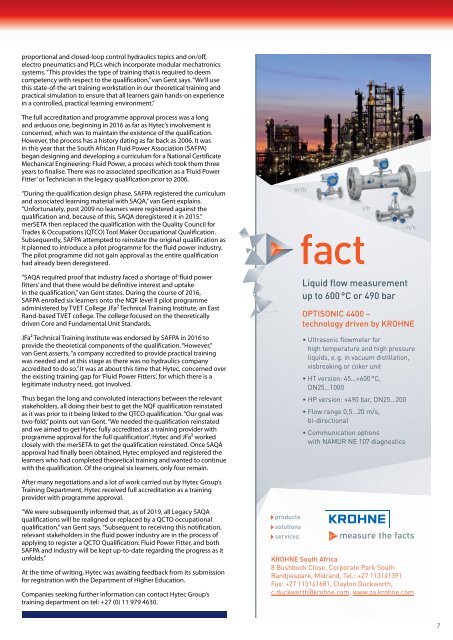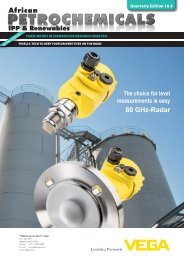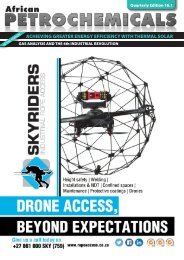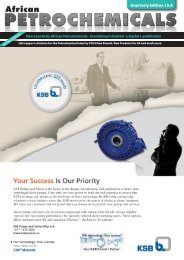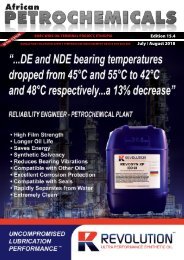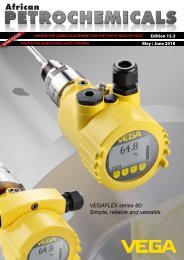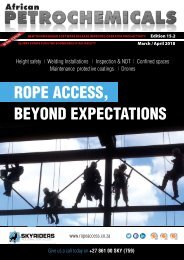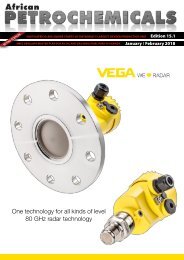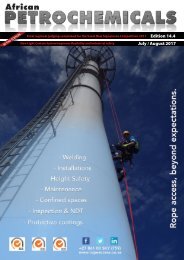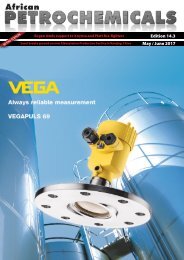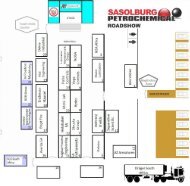African Petrochemicals Nov/Dec Edition 14.6 {2017}
- No tags were found...
You also want an ePaper? Increase the reach of your titles
YUMPU automatically turns print PDFs into web optimized ePapers that Google loves.
proportional and closed-loop control hydraulics topics and on/off,<br />
electro pneumatics and PLCs which incorporate modular mechatronics<br />
systems. “This provides the type of training that is required to deem<br />
competency with respect to the qualification,” van Gent says. “We’ll use<br />
this state-of-the-art training workstation in our theoretical training and<br />
practical simulation to ensure that all learners gain hands-on experience<br />
in a controlled, practical learning environment.”<br />
The full accreditation and programme approval process was a long<br />
and arduous one, beginning in 2016 as far as Hytec’s involvement is<br />
concerned, which was to maintain the existence of the qualification.<br />
However, the process has a history dating as far back as 2006. It was<br />
in this year that the South <strong>African</strong> Fluid Power Association (SAFPA)<br />
began designing and developing a curriculum for a National Certificate<br />
Mechanical Engineering: Fluid Power, a process which took them three<br />
years to finalise. There was no associated specification as a ‘Fluid Power<br />
Fitter’ or Technician in the legacy qualification prior to 2006.<br />
“During the qualification design phase, SAFPA registered the curriculum<br />
and associated learning material with SAQA,” van Gent explains.<br />
“Unfortunately, post 2009 no learners were registered against the<br />
qualification and, because of this, SAQA deregistered it in 2015.”<br />
merSETA then replaced the qualification with the Quality Council for<br />
Trades & Occupations (QTCO) Tool Maker Occupational Qualification.<br />
Subsequently, SAFPA attempted to reinstate the original qualification as<br />
it planned to introduce a pilot programme for the fluid power industry.<br />
The pilot programme did not gain approval as the entire qualification<br />
had already been deregistered.<br />
m3⁄h<br />
l/h<br />
fact<br />
m/s<br />
“SAQA required proof that industry faced a shortage of ‘fluid power<br />
fitters’ and that there would be definitive interest and uptake<br />
in the qualification,” van Gent states. During the course of 2016,<br />
SAFPA enrolled six learners onto the NQF level II pilot programme<br />
administered by TVET College JFa² Technical Training Institute, an East<br />
Rand-based TVET college. The college focused on the theoretically<br />
driven Core and Fundamental Unit Standards.<br />
JFa² Technical Training Institute was endorsed by SAFPA in 2016 to<br />
provide the theoretical components of the qualification. “However,”<br />
van Gent asserts, “a company accredited to provide practical training<br />
was needed and at this stage as there was no hydraulics company<br />
accredited to do so.” It was at about this time that Hytec, concerned over<br />
the existing training gap for ‘Fluid Power Fitters’, for which there is a<br />
legitimate industry need, got involved.<br />
Thus began the long and convoluted interactions between the relevant<br />
stakeholders, all doing their best to get the NQF qualification reinstated<br />
as it was prior to it being linked to the QTCO qualification. “Our goal was<br />
two-fold,” points out van Gent. “We needed the qualification reinstated<br />
and we aimed to get Hytec fully accredited as a training provider with<br />
programme approval for the full qualification”. Hytec and JFa² worked<br />
closely with the merSETA to get the qualification reinstated. Once SAQA<br />
approval had finally been obtained, Hytec employed and registered the<br />
learners who had completed theoretical training and wanted to continue<br />
with the qualification. Of the original six learners, only four remain.<br />
Liquid flow measurement<br />
up to 600 °C or 490 bar<br />
OPTISONIC 4400 –<br />
technology driven by KROHNE<br />
• Ultrasonic flowmeter for<br />
high temperature and high pressure<br />
liquids, e. g. in vacuum distillation,<br />
visbreaking or coker unit<br />
• HT version: 45…+600 °C,<br />
DN25…1000<br />
• HP version: ≤490 bar, DN25…200<br />
• Flow range 0,5…20 m/s,<br />
bi-directional<br />
• Communication options<br />
with NAMUR NE 107 diagnostics<br />
After many negotiations and a lot of work carried out by Hytec Group’s<br />
Training Department, Hytec received full accreditation as a training<br />
provider with programme approval.<br />
“We were subsequently informed that, as of 2019, all Legacy SAQA<br />
qualifications will be realigned or replaced by a QCTO occupational<br />
qualification,” van Gent says. “Subsequent to receiving this notification,<br />
relevant stakeholders in the fluid power industry are in the process of<br />
applying to register a QCTO Qualification: Fluid Power Fitter, and both<br />
SAFPA and industry will be kept up-to-date regarding the progress as it<br />
unfolds.”<br />
At the time of writing, Hytec was awaiting feedback from its submission<br />
for registration with the Department of Higher Education.<br />
Companies seeking further information can contact Hytec Group’s<br />
training department on tel: +27 (0) 11 979 4630.<br />
KROHNE South Africa<br />
8 Bushbuck Close, Corporate Park South<br />
Randjiespark, Midrand, Tel.: +27 113141391<br />
Fax: +27 113141681, Clayton Duckworth,<br />
c.duckworth@krohne.com, www.za.krohne.com<br />
7


